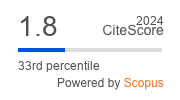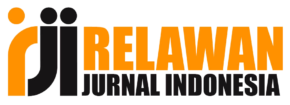Network Security Analysis Simulation at the GCS in the UCAV to support the Indonesian Defense Area
Abstract
An unmanned Combat Aerial Vehicle (UCAV) is an unmanned aircraft that has a serial control communication device that can be seen directly in real-time. In carrying out UCAV flights, it requires good and stable data transmission security so that signal loss does not occur during the communication process. Researchers create a concept of a security scheme in communication at the Ground Control Station (GCS) that can be used for the use of UCAV communication at long distances, using the Quality of Service (QoS) method from OPEN VPN with parameters Throughput, Packet Loss, Delay (Latency) and Jitter can determine the reliability of a UCAV communication network. Based on the results of Quality of Service (QoS) testing with OpenVPN Autopilot UCAV objects on the ICMP protocol have the smallest packet loss value of 0%, the delay parameter is 5.2ms, the jitter parameter gets a high value of 4.68 ms higher than the TCP protocol and UDP. The TCP protocol has a relatively small packet loss value of 0.3% and ranks second to the ICMP protocol, then the delay value is 8.48 ms greater than the ICMP and UDP protocols, and the jitter parameter value is 0.0013 ms smaller than the ICMP and UDP protocols. The use of VPN OVPN is a good recommendation. Still, researchers suggest that should use not only OPEN VPN but also L2TP VPN and PPTP VPN for security at the Ground Control Station at UCAV as a comparison.
Downloads
References
B. J. Silalahi, A. M. Panjaitan, F. Tinus, and H. Feryandi, “Implementing Remote Sensing and Drone Mapping Technology for Land Management in Indonesia ’ s Boundary Zone Implementing Remote Sensing and Drone Mapping Technology for Land Management in Indonesia ’ s Boundary Zone Budi Jaya Silalahi , Albert Midian Panj,” no. 8321, 2016.
M. Zulkifli, Moeljadi, M. Fadli, and Nurjanah, “Strengthening Indonesia Naval Base As a Aircraft Carrier At the Frontier To Increase Power of Deterrence and State Defense At Sea,” Russ. J. Agric. Socio-Economic Sci., vol. 117, no. 9, pp. 3–13, 2021.
V. Alcácer and V. Cruz-machado, “Engineering Science and Technology , an International Journal Scanning the Industry 4 . 0 : A Literature Review on Technologies for Manufacturing Systems,” vol. 22, pp. 899–919, 2019.
B. P. Zen, R. A. G. Gultom, and A. H. S. Reksoprodjo, “Analisis Security Assessment Menggunakan Metode Penetration Testing dalam Menjaga Kapabilitas Keamanan Teknologi Informasi Pertahanan Negara,” J. Teknol. Penginderaan, vol. 2, no. 1, pp. 105–122, 2020.
S. Luo et al., “Network for hypersonic UCAV swarms,” Sci. China Inf. Sci., vol. 63, no. 4, pp. 1–28, 2020.
M. Mahardika, G. Nugroho, and E. Y. Prasetyo, “UAV long range surveillance system based on BiQuad antenna for the Ground Control Station,” Proc. - 14th IEEE Student Conf. Res. Dev. Adv. Technol. Humanit. SCOReD 2016, pp. 3–7, 2017.
A. Chriki, H. Touati, H. Snoussi, and F. Kamoun, “FANET: Communication, mobility models and security issues,” Comput. Networks, vol. 163, p. 106877, 2019.
P. Dybiec, “Mobile Networks’ Support for Large-Scale UAV Services 1,2,” pp. 1–19, 2022.
L. Yue, Q. Xiaohui, L. Xiaodong, and X. Qunli, “Deep reinforcement learning and its application in autonomous fitting optimization for attack areas of UCAVs,” J. Syst. Eng. Electron., vol. 31, no. 4, pp. 734–742, 2020.
N. F. Puspitasari and A. Dahlan, “Analisa Trafik dan Quality of Service (QoS) Untuk Optimalisasi Manajemen Bandwith ( Studi Kasus : Universitas AMIKOM Yogyakarta ),” J. Ilm. Data Manaj. dan Teknol. Inf., vol. 148, pp. 148–162, 2017.
I. Nurrobi, K. Kusnadi, and R. Adam, “Penerapan Metode QoS (Quality of Service) untuk Menganalisa Kualitas Kinerja Jaringan Wireless,” J. Digit, vol. 10, no. 1, p. 47, 2020.
R. Syahputra, Rahmadi Kurnia, and Rian Ferdian, “Analysis of FHRP Design and Implementation in RIPv2 and OSPF Routing Protocols,” J. RESTI (Rekayasa Sist. dan Teknol. Informasi), vol. 4, no. 1, pp. 102–108, 2020.
M. Yannuzzi, X. Masip-Bruin, R. Serral-Gracia, E. Marin-Tordera, A. Sprintson, and A. Orda, “Maximum Coverage at Minimum Cost for Multi-Domain IP/MPLS Networks,” no. May, pp. 1831–1839, 2008.
M. Karakus and A. Durresi, “Quality of Service (QoS) in Software Defined Networking (SDN): A survey,” J. Netw. Comput. Appl., vol. 80, pp. 200–218, 2017.
Y. Firmansyah, N. Rahayu, Y. Prabowo, I. N. Y. Putro, and F. Kurniawan, “Quality of Service (QoS) Analysis for Real-Time Telemetry by IP Satellite Communication,” Proceeding - 2020 Int. Conf. Radar, Antenna, Microwave, Electron. Telecommun. ICRAMET 2020, pp. 18–21, 2020.
ITU-T, “G.1010: End-user multimedia QoS categories,” Int. Telecommun. Union, vol. 1010, 2001.
F. G. Becker et al., “Standard Interfaces of UAV Control System (UCS) For NATO UAV Interoperability,” Syria Stud., vol. 7, no. 1, pp. 37–72, 2015.
R. Azhar, H. Santoso, and F. Faisal, “Analisa Quality Of Service Menggunakan Aplikasi Gnump3d sebagai Server Media Streaming,” J. Bumigora Inf. Technol., vol. 3, no. 1, pp. 45–55, 2021.
A. Ahad, M. Tahir, and K. L. A. Yau, “5G-based smart healthcare network: Architecture, taxonomy, challenges and future research directions,” IEEE Access, vol. 7, pp. 100747–100762, 2019.
M. S. Bahbahani and E. Alsusa, “A Cooperative Clustering Protocol with Duty Cycling for Energy Harvesting Enabled Wireless Sensor Networks,” IEEE Trans. Wirel. Commun., vol. 17, no. 1, pp. 101–111, 2018.
ETSI, “Telecommunications and Internet Protocol Harmonization Over Networks (TIPHON); General aspects of Quality of Service (QoS),” Etsi Tr 101 329 V2.1.1, vol. 1, pp. 1–37, 1999.
A. Budiman, A. Sucipto, and A. R. Dian, “Analisis Quality of Service Routing MPLS OSPF Terhadap Gangguan Link Failure,” Techno.Com, vol. 20, no. 1, pp. 28–37, 2021.
I. Suryani, L. Lindawati, and I. Salamah, “Analisa QOS (Quality Of Service) Jaringan Internet Di Teknik Elektro Politeknik Negeri Sriwijaya,” It J. Res. Dev., vol. 3, no. 1, pp. 32–42, 2018.
D. Hartono and S. Darmawan, “Pemanfaatan Unmanned Aerial Vehicle (UAV) Jenis Quadcopter untuk Percepatan Pemetaan Bidang Tanah (Studi Kasus: Desa Solokan Jeruk Kabupaten Bandung),” Reka Geomatika, vol. 2018, no. 1, pp. 30–40, 2019.
Copyright (c) 2022 Jurnal RESTI (Rekayasa Sistem dan Teknologi Informasi)

This work is licensed under a Creative Commons Attribution 4.0 International License.
Copyright in each article belongs to the author
- The author acknowledges that the RESTI Journal (System Engineering and Information Technology) is the first publisher to publish with a license Creative Commons Attribution 4.0 International License.
- Authors can enter writing separately, arrange the non-exclusive distribution of manuscripts that have been published in this journal into other versions (eg sent to the author's institutional repository, publication in a book, etc.), by acknowledging that the manuscript has been published for the first time in the RESTI (Rekayasa Sistem dan Teknologi Informasi) journal ;








